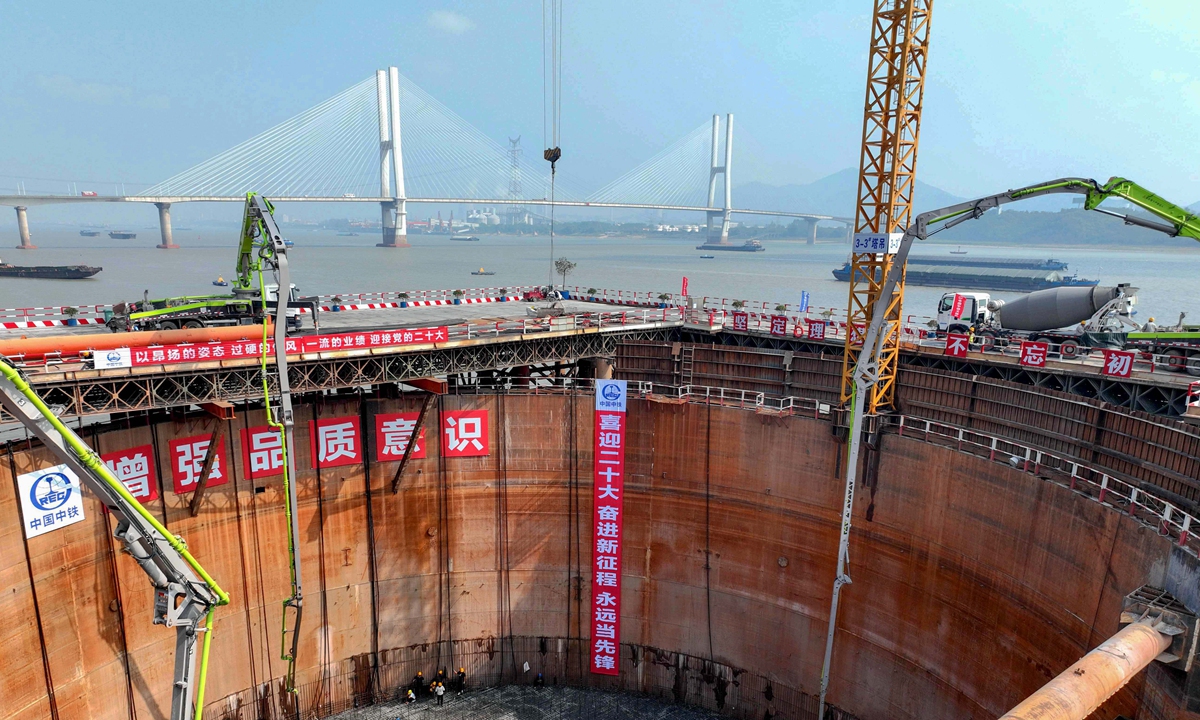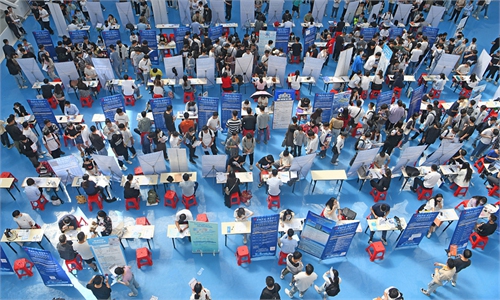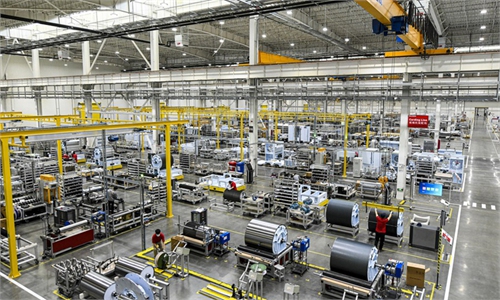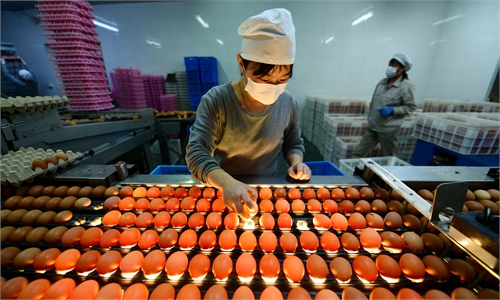China’s economic recovery estimated to continue in coming months: NBS
China’s optimized COVID response measures to revive consumption: expert

Hundreds of employees work around the clock as a 72-hour cement pumping task begins at one of the piers of a Yangtze River bridge at Tongling, East China's Anhui Province on October 16, 2022. Nationwide infrastructure investment grew by 8.3 percent year-on-year in the January-August period. Photo: cnsphoto
China's economy withstood the impact of many unexpected headwinds in October and continued to recover, though slowly, the National Bureau of Statistics (NBS) said on Tuesday.However, the international situation is becoming more volatile now, so the foundation for the country's economic recovery is not yet solid, the bureau said.
China needs to coordinate coronavirus curbs with economic and social development in a more scientific and efficient way, expand market demand, and continue to stabilize employment and price levels, the NBS said.
Some sectors, including advanced manufacturing and e-commerce, showed recovery signs in October, according to NBS data released on Tuesday.
In October, the added value of industrial enterprises above designated size rose 5 percent year-on-year, which was 0.33 percentage points higher than September. The value-added of advanced manufacturing rose 10.6 percent, 1.3 percentage points faster than September.
The surveyed urban jobless rate stood at 5.5 percent in October, unchanged from the previous month. The consumer price index rose 2.1 percent. Excluding food and energy prices, the core CPI rose just 0.6 percent from a year earlier.
Retail sales totaled 4.0271 trillion yuan ($572 billion) in October, down 0.5 percent year-on-year. Retail sales of commodities reached 3.6171 trillion yuan, up 0.5 percent year-on-year, while the revenue of the catering sector slid 8.1 percent to 409.9 billion yuan. Retail sales of auto vehicles totaled 369.5 billion yuan in October, up 3.9 percent year-on-year.
From January to October, total retail sales grew 0.6 percent year-on-year. Online sales of physical goods rose 7.2 percent and accounted for 26.2 percent of total retail sales.
Economic figures were largely in line with expectations. Online commodity transactions remained at a reasonable level, while services took a hit, indicating epidemic control measures had a significant impact on the sector, Zheng Lei, chief economist at Samoyed Cloud Technology Group, told the Global Times on Tuesday.
"As the country's anti-epidemic measures are now optimized, there is room for consumption to pick up," said Zheng.
On Friday, the government announced 20 detailed measures on optimizing the response to coronavirus flare-ups. The measures will likely make epidemic response more targeted and science-based, according to a notice posted on the website of the State Council, China's cabinet.
With the implementation of new policies to promote sales, it is expected that consumption will improve as the national economy gradually recovers and residents' employment and income pick up, Fu Linghui, a spokesperson for the NBS, said on Tuesday at a press conference in Beijing.
"In the coming days, the impact of the COVID-19 epidemic will likely persist, but it could be short-term. There are more favorable conditions for us to see a consumption revival soon in China," said Fu.
Analysts said that with the optimized anti-epidemic measures recently adopted, there is considerable room for the recovery and growth of consumption, which is a major driving force of economic growth.
"I predict the growth of consumption will return to around 5 percent gradually. At the current stage, it looks that the real estate sector slowdown is a major drag on the economy," Tian Yun, a veteran economist based in Beijing, told the Global Times on Tuesday.
It will take a long time for the real estate sector to recover, which may not happen until China's social and economic life fully returns to normal. People's outlook for economic growth should gradually recover to the level of 2019, said Tian.
But the NBS' Tuesday press conference noted some positive signs for the housing sector, analysts said.
Since the beginning of this year, in the face of the adjustment of the real estate market, some blind expansion by the developers drives their capital chain relatively tight, Fu said.
"The NBS conference acknowledged that the downturn of the housing market is continuing. The statement of the NBS showed that the central government has paid rising attention to the sector. This will play a positive role in our understanding of subsequent policy trends," Yan Yuejin, research director at Shanghai-based E-house China R&D Institute, told the Global Times on Tuesday.
In view of the pressures on the economy, as well as investment and consumption, the real estate sector truly needs continuous support. It's hoped that the property sector will in turn drive up investment and consumption, said Yan.



